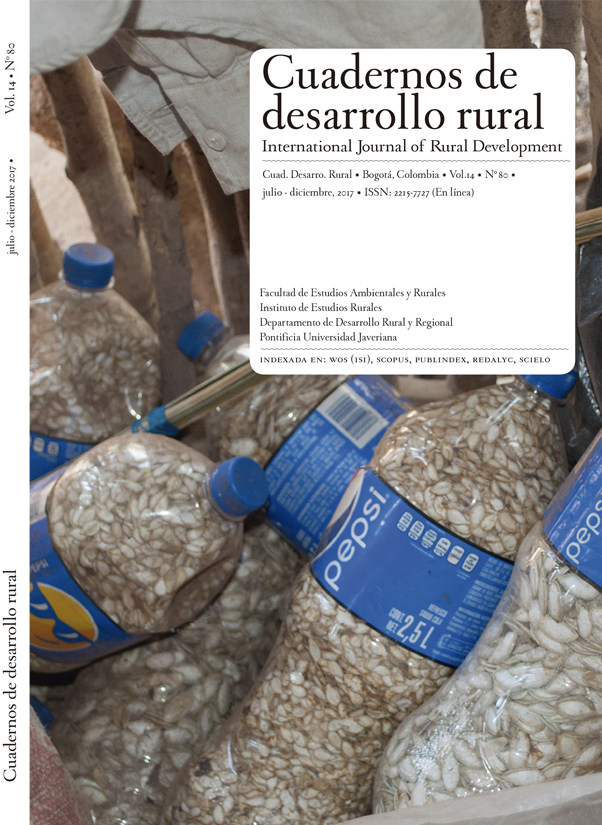Abstract
From the perspective of economic complexity, development could be explained based on the process of knowledge accumulation incorporated into goods and services. We examine various concepts of this perspective based on the study of the evolution of an agricultural company in Murcia (Spain) that dedicates, since 1995, to the production, handling, and commercialization of seedless table grapes and their comparison
with other traditional agricultural enterprises. Particularly, we focus on the incorporation of knowledge and information to the products and the creation of networks of both people and companies.
Barder, O. (2012). Development and Complexity. Center of Global Development in Europe.
Coase, R. H. (1937). The Nature of the Firm. Economica, 4(16), 386-405. https://doi.org/10.2307/2626876
Hausmann, R., Cheston, T., & Santos, M. A. (2015). La complejidad economica de Chiapas : analisis de capacidades y posibilidades de diversificacion productiva. [Cambridge, MA] : Center for International Development at Harvard University.
Hausmann, R., Hidalgo, C. A., Bustos, S., Coscia, M., Simoes, A., Yildririm, M. A. (2013). The atlas of economic complexity : mapping paths to prosperity. Updated edition. Cambridge, MA : The MIT Press.
Hausmann, R., Hidalgo, C. A., Bustos, S., Coscia, M., Chung, S., Jiménez, J., Simoes, A., Yildririm, M. A. (2011). The atlas of economic complexity : mapping paths to prosperity. Center for International Development, Harvard Kennedy School, MacroConnections MIT.
Hausmann, R., & Klinger, B. (2006). Structural Transformation and Patterns of Comparative Advantage in the Product Space (SSRN Scholarly Paper No. ID 939646). Rochester, NY: Social Science Research Network.
Hidalgo, C. (2015). Why Information Grows: The Evolution of Order, from Atoms to Economies. New York: Basic Books.
Hidalgo, C. A., Hausmann, R., & Dasgupta, P. S. (2009). The Building Blocks of Economic Complexity. Proceedings of the National Academy of Sciences of the United States of America, 106(26), 10570-10575.
Hidalgo, C. A., Klinger, B., Barabási, A.-L., & Hausmann, R. (2007). The Product Space Conditions the Development of Nations. Science, 317(5837), 482-487. https://doi.org/10.1126/science.1144581
Martínez Carazo, P.C. (2006). El método de estudio de caso: estrategia metodológica de la investigación científica. Pensamiento & Gestión, 20, 165-193.
Rodrik, D. (2005). Políticas de diversificación económica. Revista de la CEPAL, 87, 7-23.
Cuadernos de Desarrollo Ruralis registered under a Creative Commons Attribution 4.0 International Public License. Thus, this work may be reproduced, distributed, and publicly shared in digital format, as long as the names of the authors and Pontificia Universidad Javeriana are acknowledged. Others are allowed to quote, adapt, transform, auto-archive, republish, and create based on this material, for any purpose (even commercial ones), provided the authorship is duly acknowledged, a link to the original work is provided, and it is specified if changes have been made. Pontificia Universidad Javeriana does not hold the rights of published works and the authors are solely responsible for the contents of their works; they keep the moral, intellectual, privacy, and publicity rights.
Approving the intervention of the work (review, copy-editing, translation, layout) and the following outreach, are granted through an use license and not through an assignment of rights. This means the journal and Pontificia Universidad Javeriana cannot be held responsible for any ethical malpractice by the authors. As a consequence of the protection granted by the use license, the journal is not required to publish recantations or modify information already published, unless the errata stems from the editorial management process. Publishing contents in this journal does not generate royalties for contributors.



